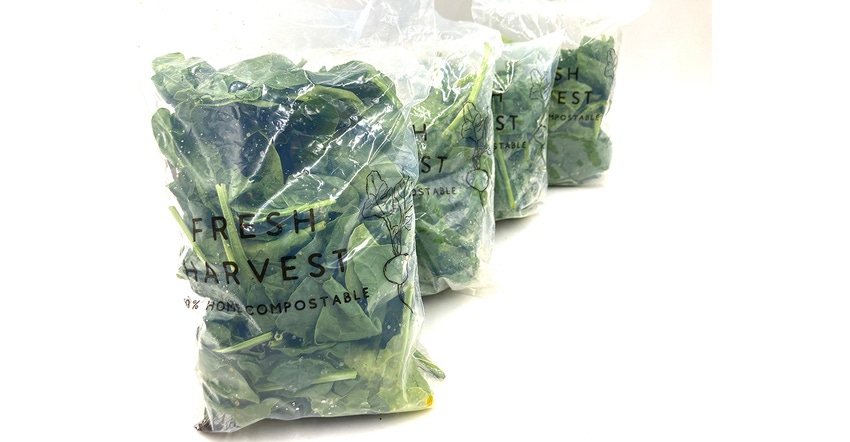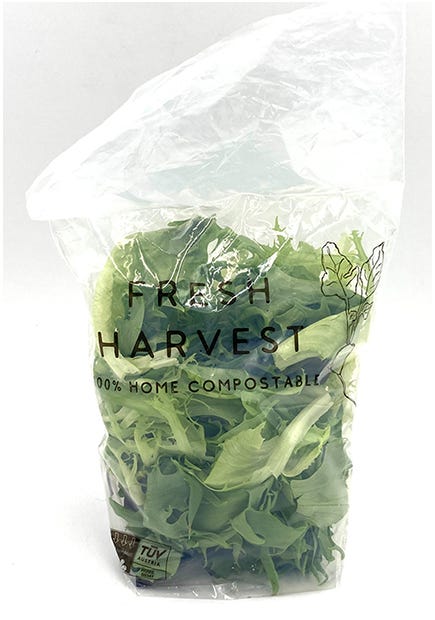Compostable Produce Packaging Adds Shelf Life and Sustainability
Tipa provides microperforated compostable bags to Fresh Harvest in Atlanta that also extend product shelf life versus standard plastic bags.
October 20, 2021

Compostable packaging solutions from Tipa are being implemented worldwide by leading brands in Europe, Australia, and the US. There is a particular focus on food and fashion industries, as these are two key markets that use a high volume of flexible packaging.
In the US, Tipa worked with Fresh Harvest to deliver effective solutions for its customers. Established in 2012, Fresh Harvest is a thriving ethical food hub in Atlanta, GA. Each week, they deliver fresh produce and groceries from local farmers and artisan producers in Georgia to thousands of customers. All items are delivered no more than 70 miles to customers in the local area as sustainability continues to be one of the company’s core values.
While all Fresh Harvest items arrive in reusable packaging, the produce must be portioned and protected in non-reusable packaging during transport to ensure it does not get damaged. Fresh Harvest desired a compostable solution that would also extend the shelf life of its perishable produce.
Fresh Harvest changed to Tipa's compostable bags in spring 2021 to protect its produce during transit and to extend the shelf life of its perishable produce, such as salad greens. Tipa bags are fully compostable and are sourced from non-GMO corn, sugarcane, and fully compostable fossil-based polymers.
For customers that don’t have access to composting facilities at home, Fresh Harvest gives customers the option to rinse and return all the packaging in their reusable bin each week to be collected and properly composted by Fresh Harvest.
In the past, Fresh Harvest had experimented with compostable packaging, but faced challenges when customers were dissatisfied with an unpleasant smell from inside the bags.
Tipa's packaging performs similarly to conventional plastic bags. The bags can be custom printed to feature a company logo and educational instructions on how to effectively compost the product, a successful combination for Fresh Harvest customers.
Shelf-life enhancing microperforation.
|
Tipa's films combined with PerfoTec’s laser microperforation technology extend the shelf life of fruit, vegetables, and flowers by up to twice as long. Similar findings were reported in two peer-reviewed studies, where TIPA compostable packaging was found to be as effective as conventional plastic and may even outperform it for the shelf-life of fresh produce. Key benefits reported by PerfoTec with Tipa bag films:
Balanced O₂ transmission level, just enough to keep the product “asleep”, with low risk of anaerobic conditions;
Balanced CO₂ transmission level, which can prevent produce tissue damage, off-color and off-odor;
High Water Vapor Transmission Rate prevents condensation, which delays development of fungi and bacteria;
Produce weight loss is kept very low.
Scientists at the Agricultural Research Organization (ARO) and The Volcani Institute in Israel used cucumbers and bell peppers to measure the differences between compostable packaging and conventional plastic packaging. They found compostable packaging enables shelf-life of bell peppers up to 21 days and cucumbers up to 15 days, results better than with conventional plastic films. The compostable packages used for the study were made from Tipa films.
By extending shelf-life Tipa's packaging improves the consumer experience and helps reduce food waste.
Under normal composting conditions, Tipa's home compostable packaging will disintegrate within six months and fully degrade within a year. The packaging is certified home compostable by TUV OK Home Compost.
Tipa was founded in 2010 by Daphna Nissenbaum and Tal Neuman to address the challenge that flexible plastic packaging poses to the environment, Tipa creates flexible packaging that’s intended to have the same end-of-life as organic matter, leaving behind no toxic residue, microplastics, or other pollutants.
Its solutions maintain the same qualities of plastic packaging that consumers and brands have come to rely on including durability, transparency, printability, and shelf-life. Tipa products already fit with industrial machinery and manufacturing practices, delivering the same performance standards as conventional plastic.
You May Also Like



